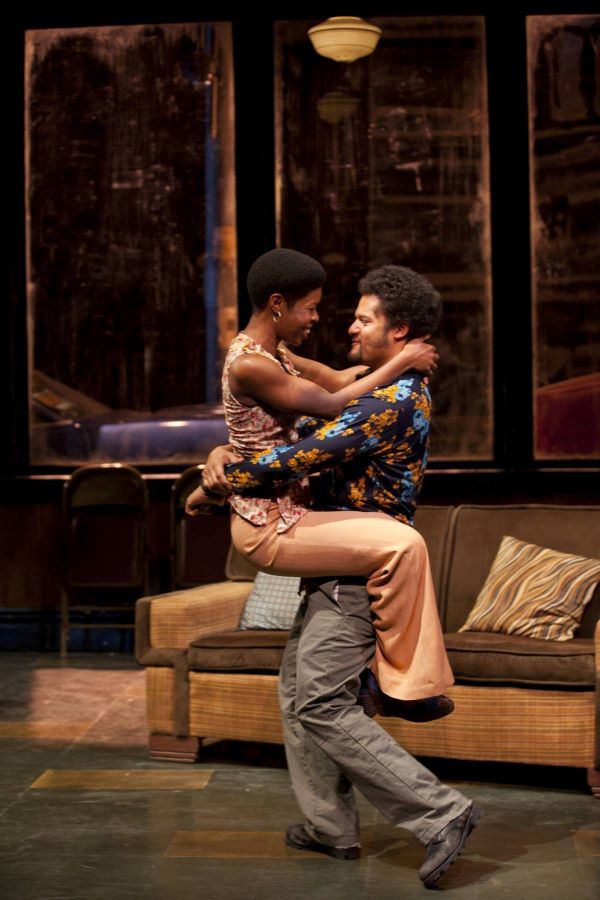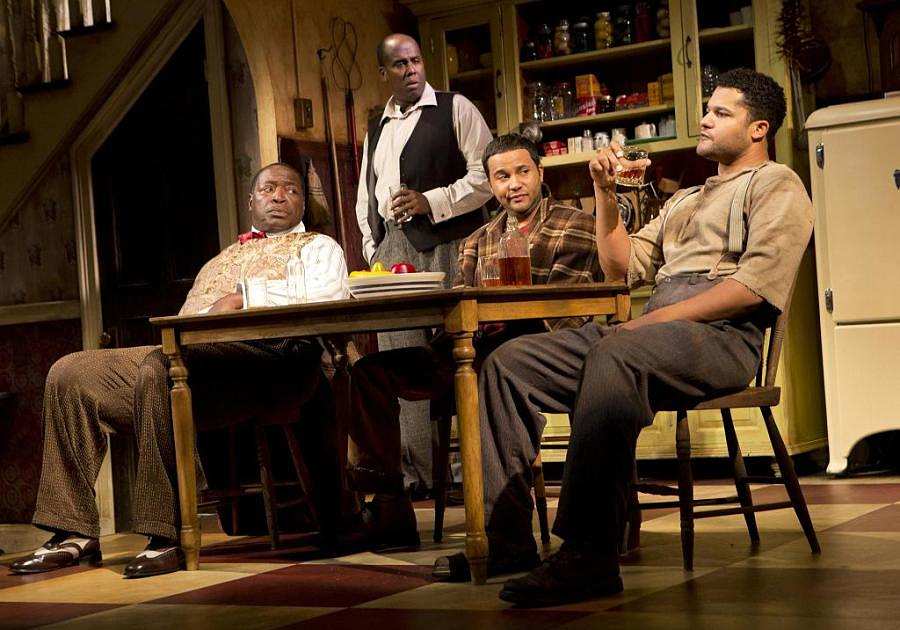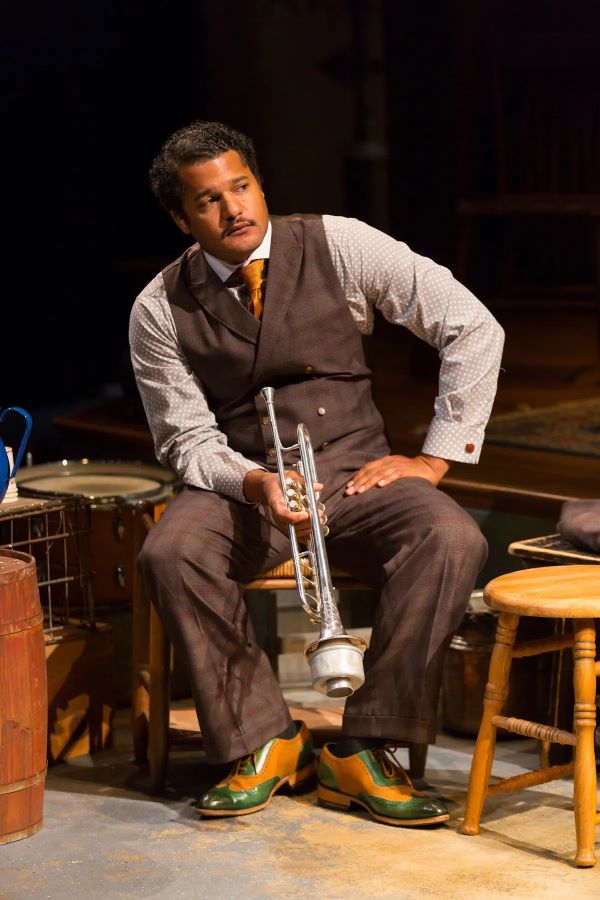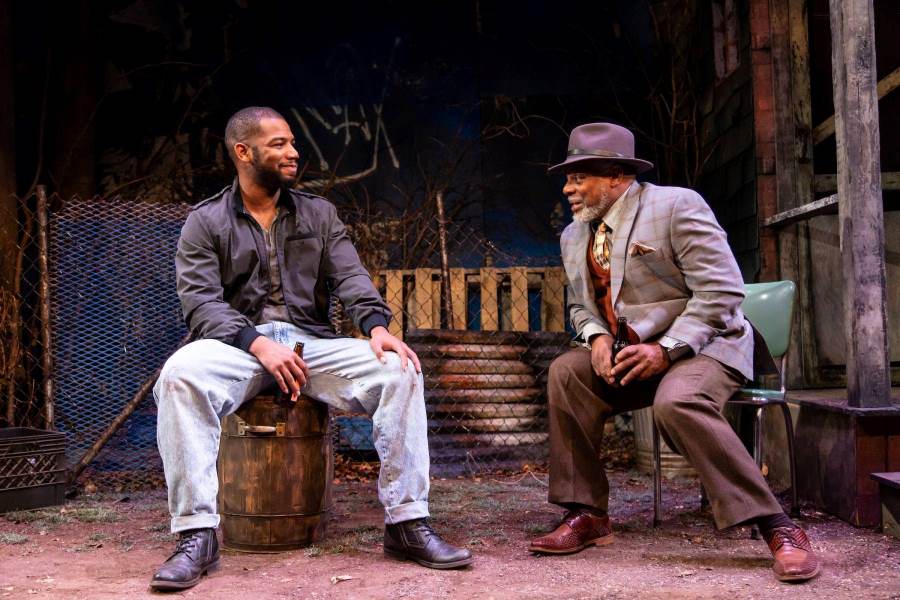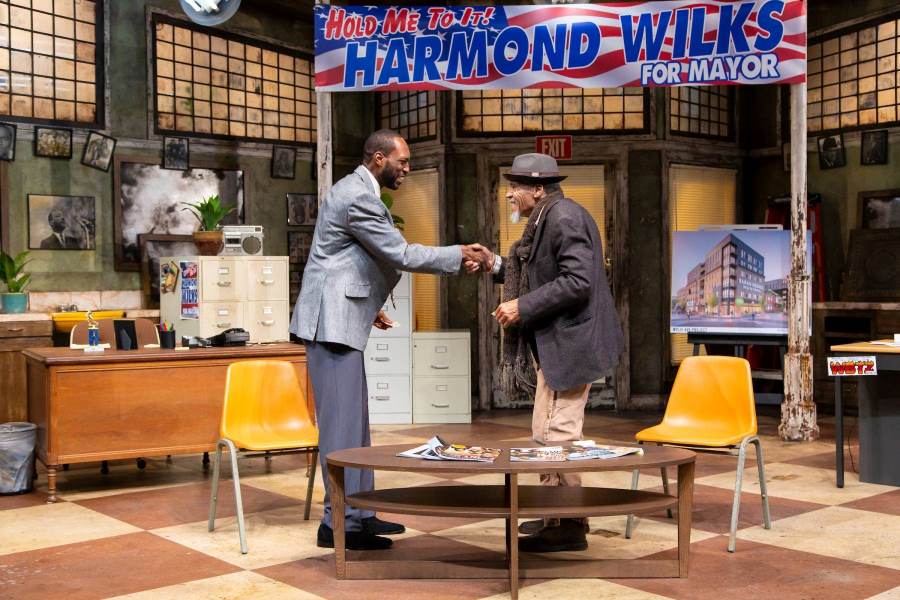This month Brandon J. Dirden joins a select group of theatre artists. With his appearance as Caesar Wilks in Gem of the Ocean at Two River Theater in Red Bank, N.J., through June 30, he completes the August Wilson cycle—i.e., he has either acted in or directed every one of the 10 plays the late playwright wrote, each set in a different decade of the 20th century.
Dirden got a bit of a head start on this journey, appearing at age 11 in the canon’s youngest role, Reuben Scott, in Joe Turner’s Come and Gone at the Alley Theatre in his hometown of Houston. Since then he’s racked up impressive credits on TV (The Americans) and on Broadway (All the Way, Skeleton Crew), with a recurring backbeat of Wilson running through his résumé.
As he told me in a recent Zoom conversation, Wilson isn’t the only long-running theme in his life: Two River Theater has also become an artistic home, as Gem marks his 12th appearance there in 12 seasons. He and his wife, the talented actor-director Crystal Dickinson, live in nearby West Orange, and she has also been a frequent presence at Two River, both alongside Dirden (in Gem as well as A Raisin in the Sun) and as an actor under his direction (in Seven Guitars and 2022’s Wine in the Wilderness).
Gem of the Ocean, set in Pittsburgh in 1904, follows a young migrant from Alabama, Citizen Barlow, who seeks healing from the spiritual leader, Aunt Ester, while conflict brews at the local mill between its Black workers and Caesar Wilks, the town’s lawman.
The following has been edited for clarity and concision.
ROB WEINERT-KENDT: Congrats on completing the cycle. Tell me, which are the ones you’ve directed but not appeared in?
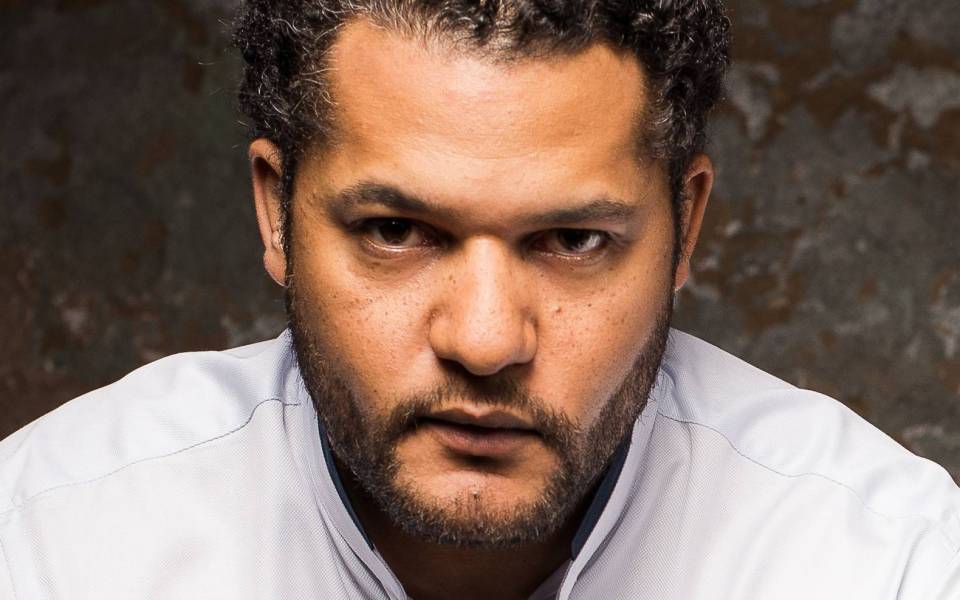
BRANDON J. DIRDEN: King Hedley II, Seven Guitars, and Radio Golf—though there’s an asterisk there. I directed it one and a half times, you could say, because we started it in January 2020, and we got through the first week of previews before it was shut down in March 2020 for the pandemic. They left the set up at Two River Theater for two years while the theatre was dark, and we came back and reopened the theatre with our production. But a couple of days before opening, the actor who played Old Joe had an emergency appendectomy—we were about to open and he just fell on the stage in rehearsals. So I had to go on, book in hand, for about a week as Old Joe. So technically I acted in that one too.
Caesar Wilks, the character you play in Gem, is the grandfather of Harmond Wilks, the lead in Radio Golf, and those plays are kind of the bookends of the cycle.
I’m so happy I’m doing this one last—you know, they say the last shall be first and the first will be last. Gem is the first chronologically. I feel like my understanding is probably just about sufficient about the lineage of the Wilks family and what August is doing with ancestry. That’s a big thing for August—in his body of work, but also personally. What I knew of him personally, in the conversations I was lucky enough to have with him, is that he was very big on lineage and on the connective tissue of family. So in a lot of his plays—even though he never claimed to be a historian—I think he was laying the groundwork to say that our roots are very deep as a people.
To come to Caesar now, after having directed Radio Golf, where Old Joe and Harmond Wilks discover they are kin—it takes 100 years for that separation to find itself resolved in Radio Golf, but this where we see that separation, in Gem of the Ocean, between Black Mary and the Wilks lineage. Then we see it repaired and come together in Radio Golf. I’d like to think that was quite intentional on August’s part, to say: It may take some time, it may take several generations, but there is a gravitational pull toward reconnecting and remembering who you are, where you come from. There’s strength, there’s power, there’s legitimacy in an understanding that we have a past that is much deeper, much richer than the one we’ve often afforded or allotted as Black people in this country. I don’t know how much I can use that as I’m playing Caesar, but just as an artist I appreciate the breadth and the scope of what August was attempting—and not only attempted but actually did—with the 10 plays.
August didn’t shy from depicting conflict among Black folks, not just in intimate human terms but also in divisions of class, generations, gender. This one has another edge because Caesar has a badge and is helping enforce the white man’s law. Can you talk about how he got to that position?
Absolutely. Caesar thinks that for every human being, our main goal is survival—and not just to survive but to best survive, given the opportunities or lack thereof. Caesar took a path that may have been unpopular for a lot of people. He saw that the lane wasn’t too crowded for someone who was willing to be unlikable to other Black people, to maintain law and order and be handsomely rewarded. You know, we always had the overseers on the plantations. So this is not a novel approach to having a better life as one can see it.
I think Caesar also feels that way because of the way he had been treated by other Black people along the journey. In his efforts to try to be fair, to be an honest businessman, he says, “I’m going to make a bakery and sell food,” and people complained about his food and gave him a hard time. He says, “Okay, I’ll open up a gambling joint in the back of the shop,” and there was a lot of fighting, he had his life threatened, he had to put some holes in people. So he feels the people weren’t treating him fairly, and I think he has a very practical way of looking at things. He has divorced himself from any allegiance based upon skin color for an allegiance to the natural order of things, and the natural order of things here in America is that there are certain benefits to upholding and maintaining the rule of law, even if it is upholding a power structure for somebody who doesn’t look like you. You’ve got to be savvy; you’ve got to play the hand that was dealt you. I think that’s Caesar’s modus operandi: I’m playing the hand the best way that I can.
I’m hearing from you what I hear from a lot of actors when they’re playing a villain or an antagonist—that you become an advocate for your character, to a fault. You have to see your character from their point of view to play them. Is that right?
Absolutely, or you let somebody else do it. Because all the characters in this play deserve a fair shake.
What are you drawing on to play Caesar?
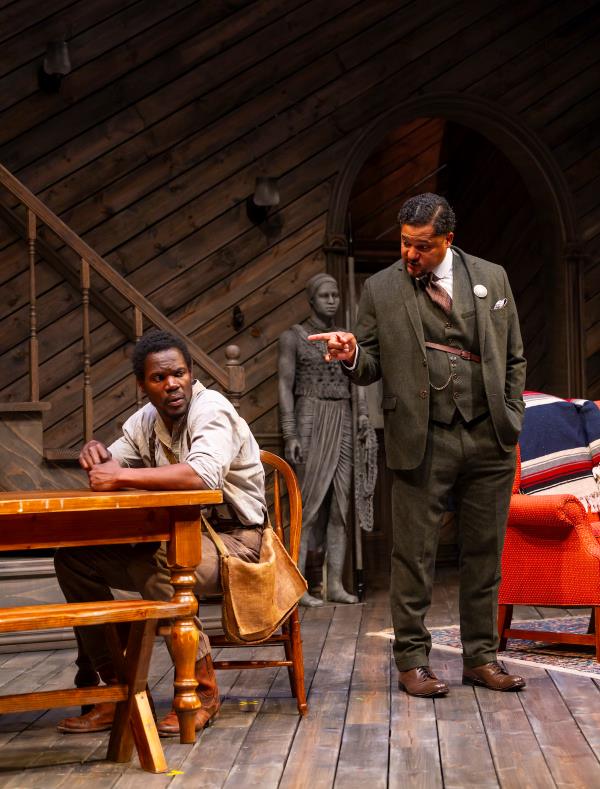
I’m originally from Houston, Texas. Excuse me for jumping around, but we’re in an election season, and one thing you hear a lot about is the courtship of the Black vote, and you hear all the time that Black people are not a monolith. I think August is exploring that idea, or building on that notion in his body of work. So you have a Caesar and you have a Solly; you have these different points of view; in Two Trains Running, you have Memphis and you have Sterling—very different points of view. They are shaped by life experiences, of course. In Texas, you do find lots of conservative Black Republicans. I absolutely believe that if Caesar were alive today, he would be a Sheriff Clarke, right? But you also have in Houston a long tradition of Black Civil Rights activists and congressman, like Al Green. Growing up in Texas gave me a full perspective of the different points of entry that are possible within the Black community, and living side by side.
The other thing that was so advantageous growing up in Houston as opposed to anywhere else in the South is that Houston had one of the largest regional theatres, the Alley Theatre, so I was afforded the opportunity to be in the production of Joe Turner’s Come and Gone when I was 11 years old. It was one of the first regional productions of the play, and it was directed by Claude Purdy, who was August’s best friend, and with the late, great Roscoe Lee Browne as Bynum. That was my first professional experience.
On that play there was an actor, Alex Allen Morris—who may have done all 10 plays in the cycle by now too—who was a company member at the Alley Theatre, and he saw how interested and committed I was, even as a young actor, and he said, “Remember this name, August Wilson; he’s going to feed your family one day.” I took this to mean, okay, I’m just going to do August Wilson plays for the rest of my life. I wasn’t even thinking about Broadway; I saw this as the life of a regional theatre actor. There was another guy, Russell Andrews, who has done a bunch of August WIlson and was one of my big brothers; the next year or two years later, I saw him do Levee in Ma Rainey’s, so I was like: “This is going to be my life, I’m just going to do August Wilson plays.”
How long was it until your next one?
You can’t really count these—and I don’t count those in my cycle—but in high school, we did a production of Ma Rainey’s Black Bottom, and I would work on scenes from Fences. The next one was another production of Joe Turner’s Come and Gone at Dartmouth College, directed by Clinton Turner Davis; I played Seth in that one. That’s how I met August. I wasn’t even a student there; I had a friend who was at Dartmouth, and she knew how much I love August, so she called me when I was at Morehouse and said, “Listen, August is going to be teaching here for this semester. We have an exchange program with Morehouse, and you need to apply for the exchange so you can be up here while he’s here.” I jumped on it, and I got to go at the very last minute—my parents had to scrape together some money to fly me to Boston. I didn’t even have a winter coat; I’d never seen snow. I had to audition for it, and I was already off-book for the entire play. I memorized the entire three-hour play, and I’ve never forgotten a line—that’s the kind of impression it made on me. Clinton Turner Davis was like, “Okay, great, you sound like you know what you’re doing.”
August was around, and quite frankly, he didn’t seem to have a full schedule when he was there; we’d see him walking around or sitting on the corner smoking cigarettes. So I would nudge up to him and bum some cigarettes. I didn’t even smoke—I would get sick as a dog trying to smoke, but I just needed those 10 minutes. After a while he figured out what I was doing, he was like, “Man, you got the same smoke breaks.” But he just loved talking to people and telling stories and sharing. He was such a people person.
So you played Reuben, then Seth—you could work your way through all the generations just in Joe Turner. And there are plenty of parts for you in the other nine plays too.
That’s the aim, right? I just hope to keep my nose clean long enough to where I can play Bynum. I mean, that’s a gift, especially to Black actors—I will even refine that to say, Black male actors. What he gave us is just an endless amount of opportunities for self-exploration through his work. At any given time, I don’t care where I am or how old I am, there will always be something appropriate for me to do in an August Wilson play. That is freeing in a way that gives me such an anchor as an artist, to know that there is something out there that I can do, even if I just want to pick up a book with my son and read aloud. It’s just remarkable.
You just alluded implicitly to one criticism he always got—that he didn’t create as many good roles for women as he did for men, though he did try to address that with the likes of Berniece and Aunt Ester. The other knock he got is the sense that he was treated as the anointed Black genius, and that his success didn’t do enough to open the door for other writers of color. What do you think of that criticism?
I wrestle with this question, Rob, I really do. I don’t think that was his responsibility or his door to open. I think it’s society’s job to make sure that anybody can walk through that door. Did his plays make a great case for the riches that are to be found when that door is open to everyone? Absolutely. But did he open the doors? I mean, do those doors get opened without Lloyd Richards at Yale Rep saying, “This is stage-worthy”? I don’t know. So I can’t give credit to August for opening those doors; I can’t speak for him or say that was his aim. I only offer that, as we start to really truthfully examine our deficiencies in the American theatre as a whole, as is the current mandate, we cannot look for this problem to be solved by someone of the marginalized group—for them to write something so undeniable that it makes the case. We must demand as an American theatre that those doors remain open to everyone, to all stories. Right?
Absolutely. Mentioning Lloyd is really important, because he literally did have the power to open doors for August and for others, and that did set an example for others. But I take the point—it wasn’t August’s job to do that.
It all goes into the pot. Next season I’m going to direct Eden by Steve Carter, a playwright who was an influence on August Wilson, just like Ron Milner or Amiri Baraka. They opened the doors just as much as August. So you can’t talk about August opening doors without looking at the body of work that came before him that was informing his taste and his skill. When you say “open the door,” that assumes it’s a point of origin, and it’s definitely not.
Right, and Samm-Art Williams’s Home is at Roundabout; there’s definitely a legacy beyond and before August. It reminds me a little bit of how Shakespeare is done to death, but companies like Red Bull are around to remind us that there were other playwrights of that period and before who are also worth doing. Also like Shakespeare, I find August Wilson a conversation starter, a lingua franca that is easy to compare notes on with so many people. Along those lines, do you have a favorite play of his?
Really, whatever one I’m working on becomes my favorite. I wish that I wouldn’t cop out and give you that answer. But as I’m now working on Gem of the Ocean, with a real intentionality of having to tell the story in front of an audience, it’s like, “Oh my God, this play is the best one.” And then if I pick up Ma Rainey tomorrow, I’ll be like, “No, this is the best.” It is an impossible question for me to give an honest answer to.
I will say there are certain plays, just based upon what they did for my trajectory as an artist and what they taught me—because every time I work on one of his plays as an actor or a director, it makes my humanity bigger, it implicates me in a way, it exposes me; I get to find out, I’m not as bad as I thought it was, or I’m even better than I thought I was, you know what I’m saying? But certainly The Piano Lesson, the 2012 production we did at the Signature where I played Boy Willie, is a seminal moment in my career. Talk about opening doors—the rooms that I was invited to be in after that particular production, it’s undeniable. And I made my directorial debut with Seven Guitars; I now have a directing career, and I have to credit Seven Guitars and my exploration of that play. So there are those two plays—but you should never have asked this, because now I’m remembering that when I did Ma Rainey’s Black Bottom on the East Coast, my brother Jason was playing Levee on the West Coast at the same time, so that was a huge moment for our family and how we intertwine with the canon as well.
Jason was also in that Piano Lesson with you, is that right?
Yeah, and earlier this year, I watched Jason do Boy Willie at the Ensemble Theatre in Houston. For years, he wouldn’t touch Boy Willie; he didn’t want to do it. I wanted to direct him, but he was like, “I don’t know, man, I can’t get your Boy Willie out of my head. I need more distance.” I guess he does have distance now; he did an incredible job. He would call me sometimes when he was in rehearsals and go, “Look, you’re gonna see this show, so I’m just gonna tell you—there ain’t no other way to say this line. So don’t think I’m trying to steal your style.”
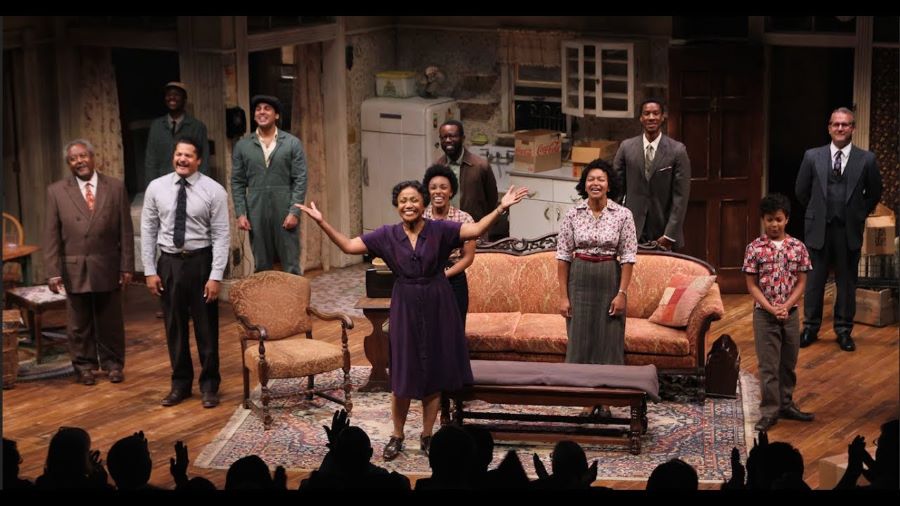
Before you go, I just want to ask about the home you’ve made at Two River.
There are Two River posters all around my office. If anyone wants to write the story of Brandon Dirden, you can’t write it without Two River Theater. You just can’t do it. That’s where I began my relationship with Ruben Santiago-Hudson and August Wilson—I’d worked with Ruben on another play in New York prior to coming here, but in terms of the relationship with Ruben and working together on August Wilson plays, Two River afforded that first opportunity. It afforded me my first opportunity to direct with Seven Guitars. It has just been a great nurturer.
There’s also an unwavering faith that what I can bring to the work as an artist will always be worth investing in. Not a lot of artists, I don’t care who you are, even if you have Pulitzer Prize, can say they have institutions that at some point don’t move on and favor the next hot thing. I’m looking at a run where I’ve either acted or directed a play there every season for the last 12 years. And not just me: My brother has worked here, and my wife. My father even got his Equity card during the production of A Raisin in the Sun at the age of 72 years old: I was doing Walter Lee, Crystal was doing Ruth, and we brought my dad in to play Bobo, that small but really pivotal role at the end. So that theatre has supported not only me but my entire family. It gives me such a confidence in knowing that this place is here, and that I can stretch out as I expand my artistic sensibilities. Next season I’m gonna direct Arthur Miller’s The Price there.
I think this is the closest thing we have to a repertory company. I grew up in a town where at the Alley Theatre you could watch Alex Allen Morris and James Black and other rep members play multiple roles over a decade or two. That is such a rare thing now, and I think to the detriment of the American theatre. But this community in Red Bank, and the New York audiences that come down, we get to be on this journey together. The artist I was 12 years ago when I started there—I’m in a different place now. So are they. And we got to do that together. It’s like when you grew up as a kid and you put your height markings on the wall, and every year you get a little taller. I can judge my life as an artist by the shows I’ve been able to do at Two River. I can see those markings year after year after year after year.
Rob Weinert-Kendt (he/him) is editor-in-chief of American Theatre.


